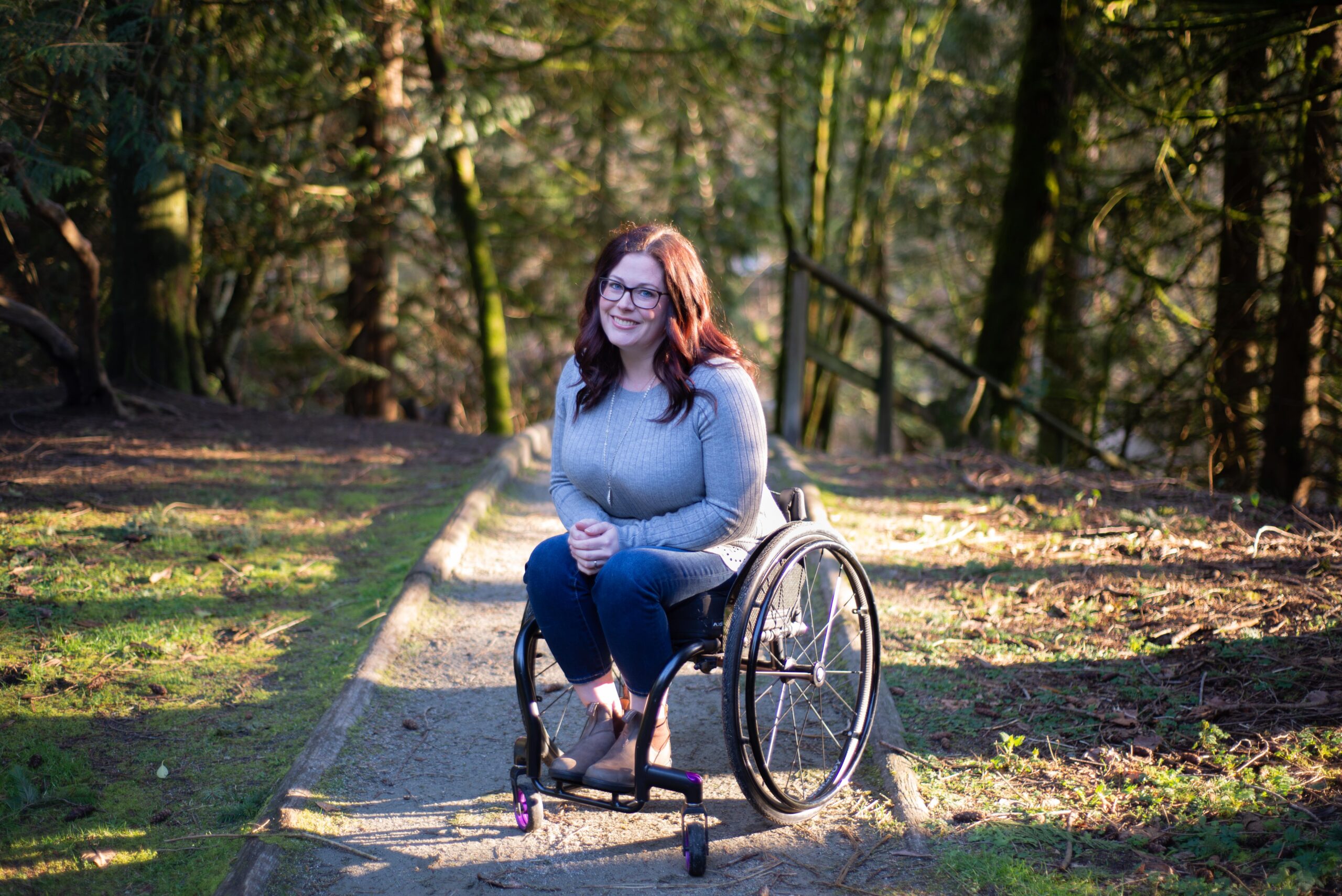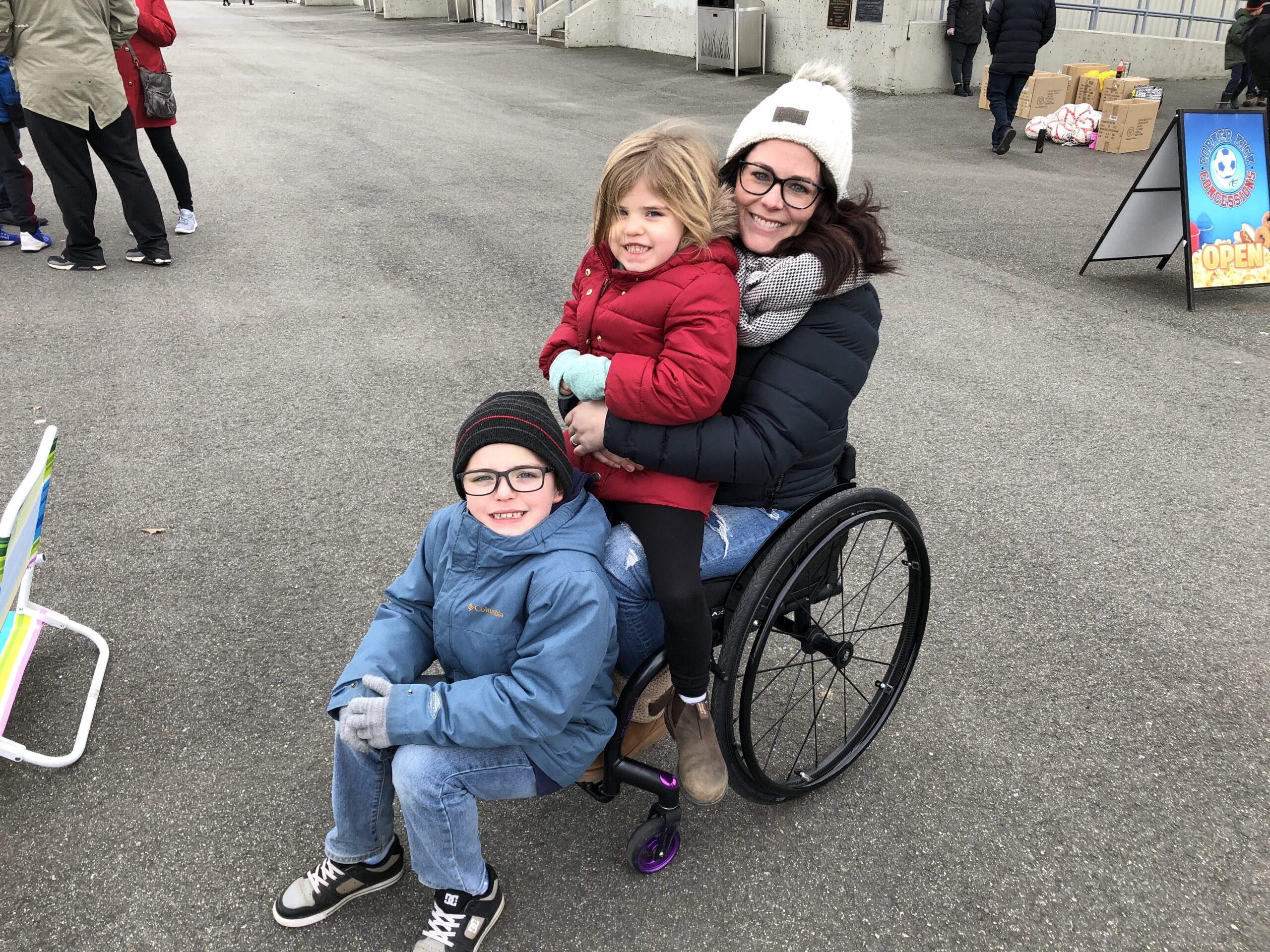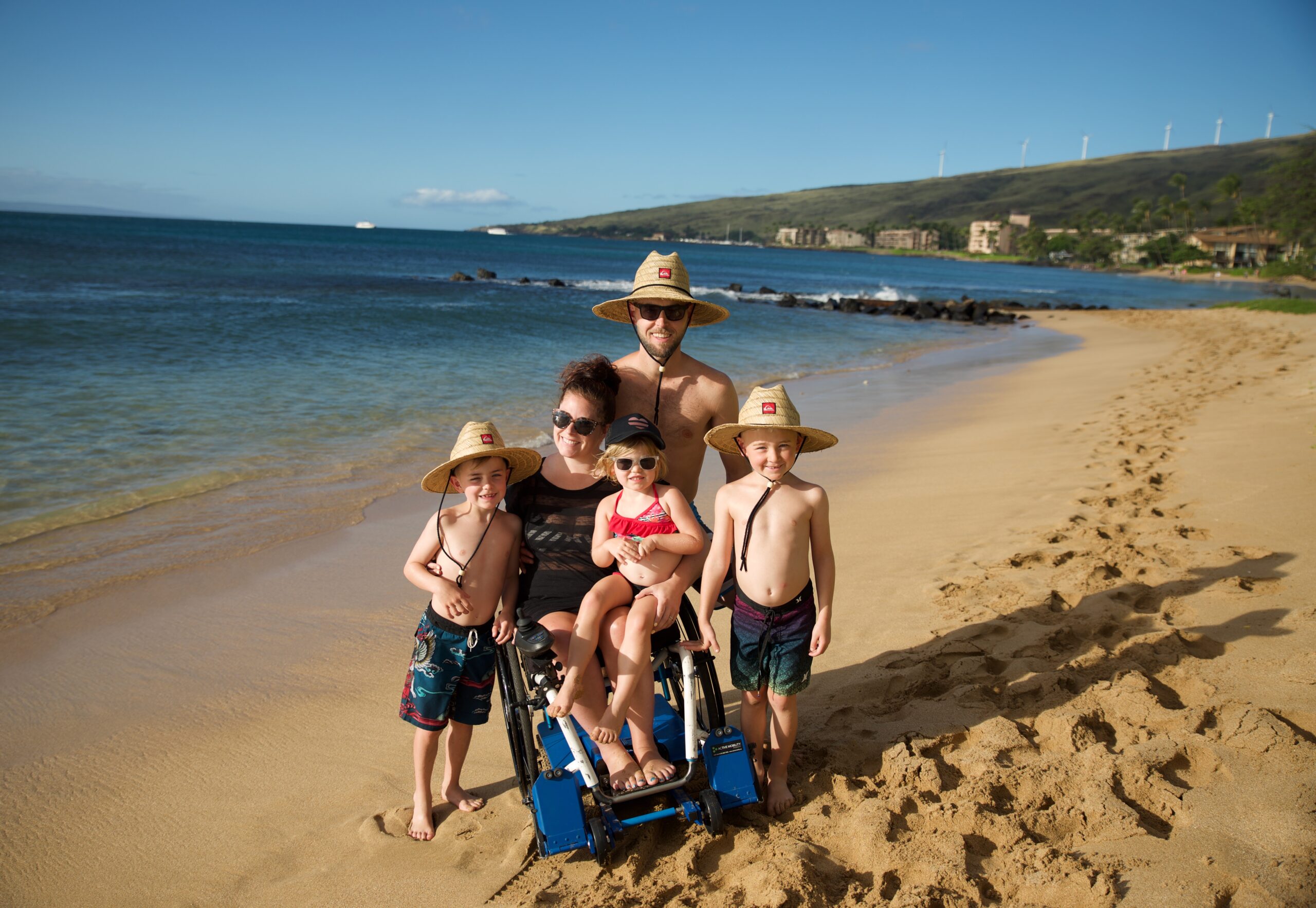
By Codi Darnell
Nancy Thompson, Interviewer
February 2, 2021
Life is unpredictable, but at 28 years old, Codi Darnell felt like she had life figured out. She had an amazing husband, three wonderful children and a great life. Then, in a single moment, everything came crashing down. On March 10, 2016, Codi suffered a fall which left her a paraplegic.
NervGen Pharma Corp. (NervGen) is honored to have our inaugural blog feature Codi Darnell, not only due to her determination to move ahead and share her journey, but because what happened to her was actually the catalyst for the formation of NervGen. After the accident, Codi’s father-in-law, Dr. Harold Punnett, a Vancouver, BC-based dentist, embarked on a journey of his own. As he struggled with his inability to fix Codi’s condition, he took himself on a vast search and networking effort to find some way to help.
“While I found there were no therapeutics available to promote nerve regeneration, I did come across the promising technology invented by Dr. Jerry Silver, a spinal cord injury and regenerative medicine researcher and professor at Case Western Reserve University,” says Dr. Punnett. “I learned that Dr. Silver had uncovered the ability to revolutionize the treatment of nerve damage so we created NervGen with the singular mission to commercialize this incredible technology.”
Codi shares her story honestly at her blog Help Codi Heal and her Facebook page as she looks to bring more awareness and understanding to spinal cord injury (SCI) and, as she says, “sort herself out on the way”.
NervGen is pleased to announce that Codi will be serving as the editor of the new NervGen blog. We sat down with Codi to learn more about her life.
What was the catalyst for your blog Help Codi Heal?
My blog was born out of two seemingly contradictory desires:
1) to be seen, and
2) to reclaim my anonymity.
In the 28 years of my able-bodied-cis-gendered-Caucasian-heterosexual existence on earth, I never felt I’d been underestimated or treated as less than because of something that was innately me. After my injury, I didn’t see why that needed to change. I wanted to be seen as the person I was beyond the wheelchair. I knew that this disabled way of living was a big secret to most people and while I had to learn it by living it, I thought that if I could bring people in, divulge the big secrets, then their questions would no longer be roadblocks in the way of seeing me.
Assuming I could make that lofty goal a reality – that I could take the mystery out of this disabled, wheelchair life I’d found myself living – I believed I would also venture back into the realm of the anonymous, where nobody stared or made vast assumptions of me in one glance.
Help Codi Heal became a place not only to share my forward journey into the disabled world but also to document the path back to finding myself.
Do you have advice for people who take their able body for granted?
This is a tough question for me because I think the idea of taking anything for granted is all based on perception. I could look at someone and easily judge them for taking their able body for granted, but that would be aligning my priorities onto them. I’m more inclined to think of my life before my injury and chastise myself for taking my body for granted.
I suppose my only advice for people would be to take some time out for self-reflection. Ask yourself, “If I lost abilities A, B and C tomorrow, would I be happy with how I used my body today?” If the answer is no then I suggest, for your own self-satisfaction, to make a change.
How do you handle communities/areas that do not provide wheelchair user access? What can people do to help provide access for all?
I’m lucky that I live in a very accessible community. I also feel incredibly fortunate to have family and friends who make an effort to make their inaccessible spaces as workable as possible. Still, coming up against something that blocks my ability to use a facility is incredibly degrading and frustrating.
I would love to say I’m a trailblazing advocate. But I’m not. I have really great intentions but find it tough to put up a fight. My biggest attempt to make an accessible difference was at our local soccer fields. It took months of phone calls and emails to different people in local government – and eventually a situation where I fell out of my chair – to get safe wheelchair access to the fields. Having to convince the city that I deserved to get to the fields safely was disheartening but it also strengthened my resolve to share my story. By adding my voice to the world, I believed it might help more people understand why universal access is important – without people needing to justify their worth.
Anyone can make a difference when it comes to accessibility. It can be something as simple as leaving ample room beside an accessible parking stall and – while I wish this didn’t need to be said – not parking in said stall if you don’t need it. But it can also just be about paying attention. Look around when you’re out in the world. Look for ramps, elevators and accessible parking and if you can bring an issue – and a solution – to the attention of people with the power to make improvements, that’s a huge step in the right direction.
What did you learn from your first solo trip in a wheelchair?
Oh yes, my first solo travel attempt. I need to preface this answer by explaining that when I say “solo”, I wasn’t totally alone but was without the safety net of my husband – the one I trust to pick me up off the ground if I fall out of my chair, piggyback me up an unavoidable staircase or, if it came to it, help me deal with an unexpected bladder or bowel issue (my greatest fear all the time, let alone in an unfamiliar place by myself).
What I learned was to trust myself and my own knowledge of my injury. I rely on my husband because he generally knows what I need from him when it comes to a difficult transfer or anything else SCI related. But on my own, I had to make sure to use my voice so that the people willing to help me could actually be helpful. My ability to move and feel parts of my body may be limited but who touches me and my chair and how they do that is still at my discretion.
The main thing that helped calm any anxiety I felt was to be prepared for the worst and hope for the best. Knowing I had the supplies I needed to take care of any SCI-related mishaps and that I had a plan in place as to where we were going to be in regards to bathroom access, meant I could relax and enjoy the experience.
How do your children handle your SCI?
 My children handled the transition to wheelchair life with all the resiliency you would expect from kids. We continue to be an active family, spending lots of time together indoors and out. My goal from the beginning was to join in with my family whenever I could and encourage them with a smile on my face to go on without me when I couldn’t, and I think we’ve achieved that.
My children handled the transition to wheelchair life with all the resiliency you would expect from kids. We continue to be an active family, spending lots of time together indoors and out. My goal from the beginning was to join in with my family whenever I could and encourage them with a smile on my face to go on without me when I couldn’t, and I think we’ve achieved that.
We all have moments of sadness when something comes up that we all want to do together and it’s not possible. But we work through it, we talk about it and we move on.
The kids have a keen eye for accessibility fails and a thorough understanding of the ups and downs of disability. They have adopted my sense of humor for wheelchair-related mishaps and know that physical ability is unequivocally irrelevant when it comes to a person’s worth and what they can offer you. I have always been and will always be Mom to them.
Tell us about a typical day in your life from when you wake up to when you retire.
It’s usually around 7AM when I wake up to my alarm with my daughter – who weasels her way into our bed after midnight most nights – beside me. The morning routine varies from day-to-day depending on where I’m at in my bathroom schedule – yes, with spinal cord injury comes a bathroom schedule. Basically, this means I’m either in the bathroom for five minutes or an hour and I have to plan for that extra time.
Most days my husband has left for work by the time the rest of us start our day and I’m tasked with making sure the three kids are up and ready for school. In typical mom fashion, there is a lot of making sure everyone has eaten something healthy(ish), that backpacks are packed and teeth have been brushed before we all pile into the car for the 12-minute drive to school.
Once the kids are all deposited to their respective classrooms, I usually have the gym, massage, chiro or physio. All of these appointments are integral to my overall well-being from strength to pain management to my mental health. Before COVID-19, I would usually have a coffee date with a friend somewhere in there too but those have become few and far between during the pandemic.
When I get home, I usually devote the rest of the school day to writing – either a blog or social media post or something for my memoir-in-progress. When I’m stuck for words, I tackle the never-ending cycle of dishes and laundry or simply take a few minutes to snuggle up on the couch with the dogs and read. If the pain or exhaustion hits then I will give myself space to take a nap.
I leave to pick up the kids from school at 2:30PM. Depending on the day, we either go straight to an activity or back home. My husband and I switch off driving to and from soccer and dance practices.
I’m a terrible cook and am thankful to have a husband who keeps us well fed – I do the meal planning and he does the cooking. We try to eat dinner as a family most nights. If it’s a free night, we might all play a game, watch a movie or disperse to our own corners of the house. In the colder months, we often go in the hot tub which has proven essential for my SCI-related temperature regulation issues. With terrible circulation in my lower body, my legs get very cold. The hot tub helps warm up the blood so when I lay down at night and the blood starts circulating around my body I’m not as apt to freeze from the inside out.
From there it’s time to get the kids to bed. Before my injury I used to crawl into one of their beds to read every night, now I usually read from my wheelchair – however I’ll do the transfer in and out of their beds a few times a week for the extra snuggles.
When the house is quiet my husband and I retreat to the couch for Netflix or to read – if it’s “Wine Wednesday” we might open a bottle of my favorite Sauvignon Blanc. Then it’s time for bed. This is when I usually start to feel shivery and turn on my heating pad to help prevent full body shaking. Overnight my body will overcompensate and I usually wake up at some point all hot and sweaty. But that’s what a shower is for.
The one thing that’s on my mind throughout the entire day is the bathroom. I have no sensation or control of my bladder so I have to keep in mind that every three or four hours I will need access to a bathroom that is wheelchair friendly. Ultimately, I’m always planning my day around my bladder and making sure to keep up with my appointments so my body is in the best shape to live my life.
